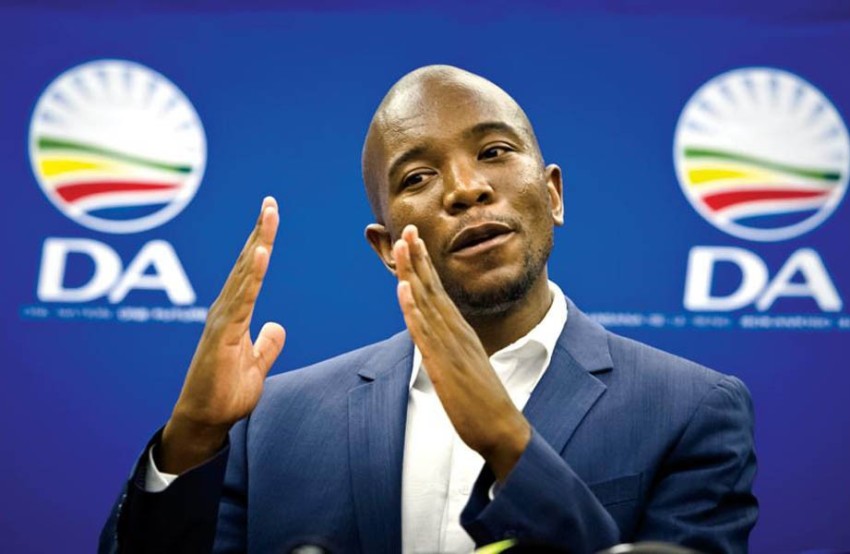JOHANNESBURG (Reuters) - South Africa's main opposition leader proclaimed the dawn of an era of 'non-racial' politics envisioned by the late Nelson Mandela on Monday, saying a bid by the African National Congress to highlight divisions at last week's local elections had backfired.
Mmusi Maimane, whose leadership of the Democratic Alliance (DA) since last year has helped overturn its image as a party for wealthy whites, called the vote a historic break with the past that could bring the DA into national government in 2019.
The ANC lost its majorities in Johannesburg, the symbolic Nelson Mandela Bay and the municipality that is home to the capital Pretoria, in its biggest ever election losses.
The party that has dominated South Africa since the end of apartheid led the overall count, but the result dealt a significant blow to President Jacob Zuma ahead of the next parliamentary vote in three years' time.
The DA is now expected to lead coalition governments in two of these electoral districts and also boosted its majority to more than two thirds in Cape Town, which it has run since 2006, a vote of confidence in its ability to govern.
Angry about corruption, unemployment and poor basic services, many ANC supporters turned to the DA - making a switch that was unthinkable only a few years ago.
"It's a incredible moment for our country," part-time preacher Maimane told Reuters, dressed top-to-toe in the DA's blue, from his leather jacket to designer shoes.
The ANC campaign focused on reminding voters of its role in ending apartheid 22 years ago, and of the DA's white roots, even comparing the party to the former apartheid regime.
Some black voters were also told they would be "black Boers" if they chose the DA, a derogatory reference to Afrikaans-speaking white farmers.
DA election posters featured images of 36-year-old Maimane in poor townships around South African cities, symbolizing his role in broadening the appeal of the Alliance, rooted in a white campaign in the 1960s against white minority rule.
"HISTORIC"
"The most historic thing about this election is people rejected the racial divisions and said its possible for black and white South Africans to work together," Maimane said.
"In 1994, the choice was between freedom or apartheid. The ANC has always sought since then to make the choice about black or white. The ANC misread South Africa."
A Christian who developed his rousing speaking style in the pulpit, Maimane is more popular with businesses than Zuma and is open to engaging with Western governments in a way that has made the ANC uncomfortable due to colonial legacies.
Zuma has dismissed Maimane's threat due to his youth and lack of experience on a continent where age is often considered an important factor in choosing a leader.
"The assessment for any leader in any political environment is the scoreboard," Maimane said, adding that Zuma should consider following Britain's David Cameron in standing down following a defeat at the ballot box.
Maimane's age, charisma and speaking style - punctured with dramatic pauses and deliberate hand gestures - have drawn comparisons with U.S. President Barack Obama.
"You could have worse tags," Maimane said, smiling.
"The Obama project was about hope, about change, and there is something about my project that could be ascribed to that."
Maimane, who has a white South African wife, came under personal attacks during campaigning from ANC members who say he is a puppet of a white elitist movement.
One insult included calling Maimane a 'coconut', implying he is black on the outside but white on the inside.
"I had to endure a barrage of racial insults. What you've got to do is to steel your back and carry on," Maimane said.
"I recognize that they wanted to do everything in their power to win, to a point when you recognize it's a tactical thing to divide the nation along racial lines."
NATIONAL ELECTIONS
Maimane said he believes it is now possible to bring the ANC's share of the vote in national elections in 2019 below 50 percent, opening up the chance of the DA ruling in a coalition.
With solid support in rural areas, the ANC still has majority support across the country, a reflection of its liberation struggle history and the significant improvement in basic living standards for poor South Africans since apartheid.
The ANC won 62 percent of the vote in 2014 national elections but only 53 percent in the local vote last week.
If the DA is to govern nationally it will need to drastically reduce inequality and convince poor black South Africans that it represents all races.
Black people make up 80 percent of the 54 million population yet, two decades after apartheid, most of the economy in terms of ownership of land and companies remains in the hands of white people, who account for 8 percent of the population.
Maimane has promised voters the DA will provide jobs, better services and eradicate corruption in the cities it runs.
"Momentum building going toward 2019 is about good governance. It's about proving to the public that we can govern nationally one day," Maimane said.
"Where we've governed, we've grown everywhere. Where the ANC has governed, they've gone down."
The DA will now go into a difficult negotiating period over coalitions, possibly having to link up with the radical leftist Economic Freedom Fighters (EFF), whose firebrand leader Julius Malema wants to nationalize mines and take land from whites.
"The initial phases have started," Maimane said of coalition talks, adding that local governments were about delivering services and not national policy shifts.
"It doesn't mean I endorse the EFF's view on white South Africans or that I endorse their philosophy on nationalization."






No comments:
Post a Comment